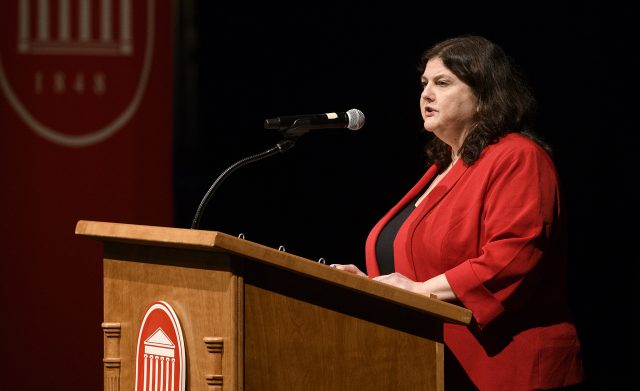
Dawn Wilkins, UM chair and professor of computer and information science, will discuss ‘Machine Learning Applications to Science: Do’s and Don’ts’ for a March 22 edition of the Oxford Science Cafe. Photo by Thomas Graning/Ole Miss Digital Imaging Services
OXFORD, Miss. – Machine learning and animal/human intimacy bonds are the topics for two hybrid Oxford Science Cafes scheduled for March 22 and 24 by faculty researchers from the University of Mississippi and University of Texas.
Both programs will be conducted in-person at Heartbreak Coffee, 265 North Lamar Ave., Suite G, and hosted on Zoom beginning at 6 p.m.
Dawn Wilkins, UM chair and professor of computer and information science, will discuss “Machine Learning Applications to Science: Do’s and Don’ts” on March 22. Steven Phelps, professor of integrative biology and director of the Center for Brain, Behavior and Evolution at the University of Texas, will discuss “A natural history of intimacy” on March 24.
“Machine learning is a way to add intelligence to an application without explicitly programming it with knowledge,” Wilkins said. “Instead, machine learning uses examples – data – as experience and builds a model of the implicit knowledge.
“The advantage of this approach is the speed at which an application can be developed and deployed.”

Steven Phelps, professor of integrative biology at the University of Texas, will discuss ‘A natural history of intimacy’ during a March 24 Oxford Science Cafe. Submitted photo
Questions to be addressed during Wilkins’ 45-minute talk include what machine learning is, how it is used, and some of the pitfalls and ethical concerns.
“Machine learning models reduce human bias in making decisions and are not limited to problems with scope manageable by humans,” Wilkins said. “On the other hand, there can be issues with the application of machine learning, including obtaining enough data, implicit biases, and difficulty in the interpretability and generalizability of the models.”
Phelps will discuss close social relationships common in the animal world.
“These relationships are essential aspects of the human experience,” he said. “They promote collaboration and engender conflict.
“This talk draws from animal behavior, neuroscience and evolutionary biology to explore how and why bonds form in species as diverse as prairie voles, poison frogs and humans.”
To view either of the presentations online, visit: https://olemiss.zoom.us/j/99989536748. A link to the recorded talk will be posted at https://www.phy.olemiss.edu/oxfordsciencecafe/.
For more information about the Department of Physics and Astronomy, which organizes the Oxford Science Cafe, visit https://physics.olemiss.edu/.